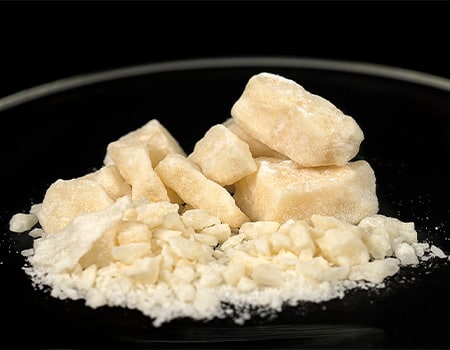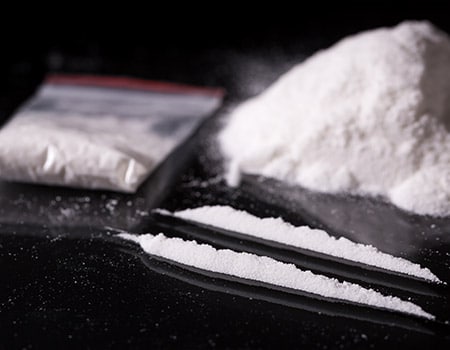Massachusetts Center for Addiction
Cocaine Addiction

Quick Summary
Cocaine addiction poses serious risks to both physical and mental health. It alters brain chemistry, leading to tolerance, dependence, and difficult withdrawal symptoms. Users may experience increased heart rate, nosebleeds, anxiety, and severe mental health complications. Long-term abuse can result in heart problems, neurological damage, and worsening psychiatric conditions.
Effective cocaine addiction treatment requires a comprehensive approach, including medical detox, therapy, and sometimes medication, along with ongoing support to maintain sobriety. Education and family support play a crucial role in helping individuals overcome addiction and prevent relapse.
What is Cocaine?
Cocaine is a highly addictive stimulant derived from the leaves of the coca plant, native to South America. It produces intense euphoria, heightened energy, and increased alertness, making it one of the most commonly abused drugs. However, repeated use can quickly lead to cocaine addiction, severe health risks, and long-term neurological damage.
Often called coke, blow, or powder, cocaine is a fine, white crystalline substance that directly affects the central nervous system. It floods the brain with dopamine, the neurotransmitter responsible for pleasure and reward, creating a short-lived but intense high. Users typically snort, smoke, or inject cocaine to achieve these effects.
Despite widespread awareness of its dangers, 1,800 Americans try cocaine for the first time every day. While its peak usage occurred in the 1980s and ’90s, cocaine addiction remains a serious issue today.


Types of Cocaine
- Cocaine hydrochloride: A water-soluble powder that can be snorted or dissolved for injection.
- Crack cocaine: A smokable, crystallized form that produces an even more intense and immediate high.
Street cocaine is often cut with substances like cornstarch or talcum powder to increase profits. However, it may also be laced with other dangerous drugs, making it even more unpredictable and hazardous.
Understanding Cocaine Addiction
Cocaine directly impacts the central nervous system, rapidly increasing dopamine levels—the neurotransmitter responsible for pleasure and reward. This surge creates an intense but short-lived high, making the brain crave repeated use. Over time, this cycle can lead to cocaine addiction as the brain becomes dependent on the drug for pleasure.
With continued use, the brain adapts to the excess dopamine, a process known as tolerance. This means a person needs larger doses to achieve the same effects, leading to compulsive drug-seeking behavior. Long-term use alters brain function, making it difficult to feel pleasure without cocaine. This condition is called dependence.
Cocaine Withdrawal and Negative Reinforcement
Quitting cocaine can be physically and emotionally challenging. As the brain adjusts to the absence of the drug, individuals may experience:
- Irritability
- Anxiety
- Depression
- Strong Cravings
These withdrawal symptoms often drive users to relapse in an attempt to relieve discomfort. This cycle, known as negative reinforcement, plays a significant role in turning casual use into addiction. Research highlights how withdrawal symptoms reinforce continued drug use, making professional cocaine addiction treatment essential for recovery.
Symptoms and Signs of Cocaine Abuse
Cocaine abuse can quickly lead to addiction and severe health consequences. Recognizing the signs and symptoms is crucial for early intervention and treatment.
Physical Symptoms of Cocaine Abuse
- Increased heart rate and blood pressure
- Dilated pupils and heightened body temperature
- Excessive sweating and nosebleeds (especially with snorting)
- Tremors or muscle twitches
- Seizures or heart complications in severe cases
Long-term use can lead to serious cardiovascular damage, including dilated cardiomyopathy, which weakens the heart muscle.
Behavioral Symptoms of Cocaine Abuse
Cocaine use also triggers significant behavioral changes, such as:
- Agitation, restlessness, and paranoia
- Increased energy followed by extreme fatigue
- Difficulty sleeping and appetite suppression
- Hallucinations or psychotic episodes in severe cases
Since cocaine’s high is short-lived, users often take repeated doses, leading to compulsive drug-seeking behavior. This can result in:
- Financial problems due to excessive spending on the drug
- Social withdrawal and isolation
- Strained relationships with family and friends
Negative Health Effects of Cocaine Abuse
Cocaine has numerous negative health consequences, affecting both your physical and mental well-being. When you abuse cocaine, you put yourself at risk for a variety of adverse health outcomes.
One of the major concerns associated with cocaine use is the increased risk of cardiovascular complications. Cocaine can raise your heart rate, constrict blood vessels, and increase blood pressure. This can lead to severe consequences such as acute myocardial infarction, cerebrovascular accidents, and even death. A study shows these cardiovascular problems can occur even in otherwise healthy individuals who use the drug.
Cocaine addiction can also exacerbate pre-existing mental health conditions, such as schizophrenia. A study found that schizophrenic patients with a family history of drug abuse were more likely to encounter adverse effects when using drugs, including cocaine.
Treatment Options for Cocaine Addiction
Overcoming cocaine addiction requires a comprehensive and individualized approach to treatment. The process typically involves several stages, beginning with detox and followed by a variety of therapeutic interventions. The treatment plan will depend on the individual’s unique needs and circumstances.
The following sections will explore the various treatment options for cocaine addiction, including medical detox, addiction treatment programs, and post-treatment support.
Medical Detox
The first step in treating cocaine addiction is often a medical detox. This process helps you safely manage withdrawal symptoms and avoid complications. Medical professionals may administer medications during detox to alleviate discomfort and monitor vital signs.
This ensures your body gradually adjusts to the absence of cocaine. Medical detox should always happen in a supervised environment, as withdrawal effects can be intense and dangerous.
Cocaine Addiction Treatment Programs
Once detox is complete, it’s time to explore cocaine addiction treatment programs. Considering your unique needs, you may choose between inpatient and outpatient options.
Inpatient programs require you to stay at a treatment facility, providing round-the-clock care and structured therapies. Outpatient programs are less intensive, permitting you to maintain responsibilities like work or school while attending regular sessions at a treatment center. Both programs typically include:
- Therapy: Cognitive-behavioral and group therapy can help you identify triggers, learn coping strategies, and develop healthier thought patterns.
- Medication: Although there are currently no FDA-approved medications specifically for treating cocaine addiction, certain medications can help manage cravings and mitigate the symptoms of withdrawal.
- Holistic therapies: Incorporating practices like yoga, mindfulness, and nutrition guidance can support your overall well-being.
Recovery and Post-treatment Support
Long-term success in overcoming cocaine addiction relies on recovery and post-treatment support. After completing a treatment program, it’s essential to stay engaged with various resources:
- Support groups: Connect with others who share similar experiences and can offer encouragement, advice, and understanding.
- Alumni programs: Many treatment centers offer ongoing support through alumni networks to help you maintain sobriety.
- Continuing therapy: Sustain personal growth and address any challenges by continuing therapy sessions with a counselor.
By following these treatment steps, you can work towards a healthier, cocaine-free life, taking advantage of the support and resources available to you.
Prevention and Education
Preventing cocaine addiction and abuse starts with education and the promotion of awareness. Schools, healthcare professionals, and community organizations all play a huge role in spreading awareness and offering support.
Resources for Family and Friends
For families and friends of those struggling with cocaine addiction, it is important to educate yourself about the signs and symptoms of abuse, steps to take for prevention, and resources available for support. Equipping yourself with proper knowledge empowers you to handle situations involving cocaine addiction.
- Understanding the risks: Become familiar with the short and long-term effects of cocaine abuse, such as increased risk of mental health issues, cardiovascular problems, and social consequences. A solid understanding of these risks can help you convey the importance of prevention and the dangers of addiction to your loved ones.
- Communicate openly: Encourage honest and open conversations about drug use, its effects, and the potential consequences. Doing so creates an environment where individuals feel comfortable discussing their concerns and experiences without judgment.
- Promote a healthy lifestyle: Help your loved ones develop positive habits like physical activity, healthy eating, and self-care practices that can act as protective factors against addiction.
- Seek professional support: If you believe someone you care about is struggling with cocaine addiction, don’t hesitate to seek professional support from healthcare providers, mental health professionals, or drug abuse prevention programs. These resources can provide guidance and assistance in addressing addiction and promoting recovery.
Getting Help with Massachusetts Center for Addiction
If you or someone you know is struggling with cocaine addiction and abuse, seek help as soon as possible. The Massachusetts Center for Addiction offers evidence-based treatment methods focused on addiction and dual diagnosis treatment.
At the Massachusetts Center for Addiction, you can expect a safe and comfortable environment that fosters healing and growth. Our dedicated team of professionals understands the unique challenges of addiction. By tailoring treatment plans to fit your specific needs, they ensure the most effective approach to recovery.
Take the first step towards achieving a healthier, happier life by reaching out to this reputable facility. Your journey to recovery is just around the corner, and the Massachusetts Center for Addiction is here to help you every step of the way. Call us today at 844-486-0671 for a free and confidential assessment.



